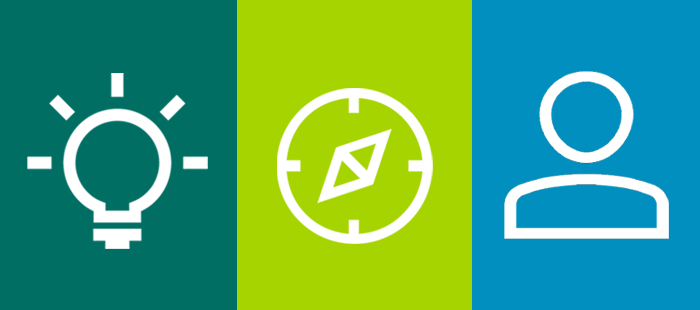Innovating for Inclusion
- Educators need to create safe spaces in which students can collaborate with each other, learn different perspectives, and generate new ideas.
- Innovation begins in society, and business schools and organizations must pay attention to these changes so they can respond to them in their practices.
- Business school leaders should set expectations for ethical standards and mutual respect, ensuring that those who don't meet the standards are not ostracized but are given opportunities to learn and become better global citizens.
Transcript
Maggie Merry: [0:14] In the last decade, schools have had to change quite a bit in the face of diversity, equity, and inclusion, belonging, and wellbeing. The name itself, what we call it has changed, necessarily, to help our fellow colleagues understand that it's more than just what somebody looks like.
[0:36] It's that diversity of thought. It's that safe space to share those thoughts. It's about the whole person.
Zayne Imam: [0:44] One of the things that I feel I've experienced a lot coming from one of the most diverse schools in Europe is that it's an incredible thing to see some of our students be able to interact with each other and interact with the perspective they may have never thought about.
[1:00] One of the things that we can do as schools is to create more and more of those safe spaces where our students, regardless of what it is that they're bringing to the table, that they might feel vulnerable or insecure about saying out loud or expressing about their particular life experience.
[1:19] That we've created a space where it's safe for them to do so, and it's safe for them to collaborate with others to think about new solutions and new approaches.
Tayah Butler: [1:29] In the next decade, we are about to experience a significant social shift. After all, it was recently in the 2020 census that the demographic of the students K through 12 have, for the first time in the United States of America, reported more students of color and more multicultural families than families who identify as white.
[1:53] In the next 10 years, those students will be arriving at our doorsteps. We're going to be confronted with very serious questions if our organizations and institutions still look predominantly one way. That's going to end up being a very difficult answer. Why? Why have we not adjusted?
[2:13] The student body, as it shifts right before our eyes, is going to demand different responses. We're going to either gracefully approach those questions and challenges, or some of us are going to have some really tough times.
Michael Henry: [2:30] Innovation doesn't necessarily start in business schools or organizations. It becomes a societal movement that we then respond to, capture, and incorporate into our business world.
[2:42] If we look at what's happening in Canada, specifically, there has been a lot of discussion over the last 7, 8 years, 10 years, with regard to more equity and more inclusion. Not just in terms of numbers, but in terms of power.
[2:59] You look at our national government, where half of our cabinet since 2015 is female in very significant positions. What that means is as organizations, we have to be willing to take the power that people like me have and give away that power.
[3:15] Not just share it, but give it away, and then respond to it in a respectful, inclusive way that actually recognizes that power is best exercised when it's distributed, when it's inclusive, and when we are working together and belonging together to create a better world.
Elizabeth Moon: [3:31] The University of California, Davis, specifically, the Graduate School of Management, has always had a forward focus on bringing in diversity, equity, inclusion, or belonging.
[3:43] In the time that I've been with UC Davis Graduate School of Management, we have worked tirelessly through our Faculty Diversity Committee, as well as through our various clubs, like Women in Leadership and the institution of the GSM Pride Club, to build out diversity, both at the faculty, student, and staff level.
[4:04] We are also really lucky at UC Davis that we have a vice chancellor of DEI in our school that began just prior to the pandemic, about a year before the pandemic hit. With their leadership throughout the pandemic, they were giving us the capacity to grow in our own efforts within our school. I feel we're very lucky in that regard.
Abdul Hanan Chowdhury: [4:30] Our school is a very big school in terms of the number of population. I came from a part of the world that has huge problem in terms of inequality, deprivation, segregation to some extent.
[4:48] Yet we are not being able to address the causes of the marginalized people, the womens, the disables, and those who are vulnerable in this society. We try to incorporate and add them in our school or within our education system, so that we see that an equitable society are going to come up eventually.
[5:15] In our country, yet, female are way too far behind. We have disabled people. For them, the environment is not yet been ready. We have marginalized an indigenous people that they cannot simply come out of the upper stream of the society. They cannot simply vent and cross that glass ceilings.
[5:39] We are open in terms of bringing people in a common platform, so that we see that at some point, everyone can come together and contribute in this society.
Joshua Park: [5:54] Our school, SolBridge International School of Business, was recently established in 2007. Our DNA really is with regards to diversity and internationalization. We were born that way. I can't say it's been an easy journey.
[6:10] Even though we have become successfully, 70 percent international from outside of the country, both for faculty and students from over 60 different countries. Being in a very homogeneous country like Korea does make it a bit difficult embracing diversity, while respecting the differences that, obviously, diversity brings.
[6:33] Bringing in students from over 60 different countries also means that we are bringing in students with different upbringings in terms of their cultural expectations, religions. This can be as simple as their expectations for meal options, but extending to more important things like gender relations or how to deal with people who are in the gender minority.
[6:58] For us, it did become a matter of, obviously, respecting them, but at the same time, setting up our own standard of ethics. What is acceptable behavior, actions, and speech? Whereas, what is not acceptable behavior, speech, and actions in our own code of conducts for students, and convincing them and inculcating our students of what is acceptable and not acceptable.
[7:24] At the same time, developing a learning environment where people who are making mistakes aren't necessarily being ostracized. They're able to learn from their mistakes and become better global citizens.
Learn more about AACSB's Innovations That Inspire member spotlight program, and view the 2022 highlighted selections.
Related video: How Leaders Can Be Champions of Diversity





